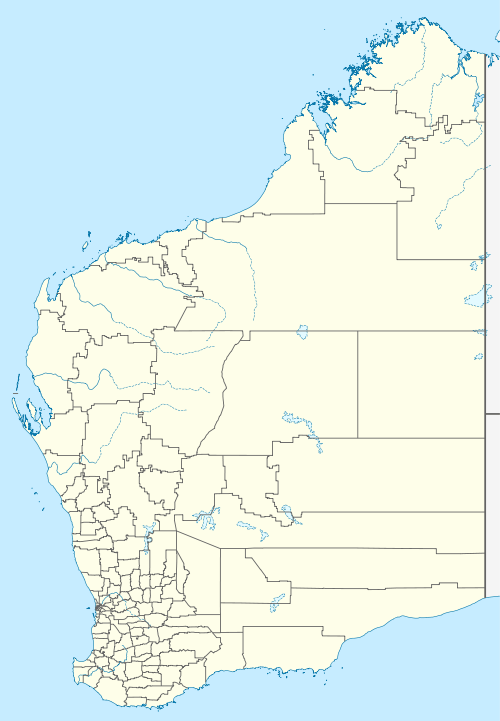Warmun Community, Western Australia
Warmun Community (also known as Turkey Creek) and Warmun are a township and locality in the Kimberley region of Western Australia, located on the Great Northern Highway, 3,000 kilometres (1,900 mi) northeast of Perth.[2] The closest populated town is Halls Creek.
| Warmun Community Western Australia | |
|---|---|
 Warmun Community | |
| Coordinates | 17°02′00″S 128°13′00″E |
| Population | 210 (2006 census)[1] |
| Postcode(s) | 6740 |
| Elevation | 207 m (679 ft) |
| Location |
|
| LGA(s) | Shire of Halls Creek |
| State electorate(s) | Kimberley |
| Federal Division(s) | Durack |
The area was settled by European pastoralists in the 19th century but the community was established in 1901 when the state government built a ration depot at Turkey Creek.[3]
The Ngalangangpum School was established in town at the request of the community. Built in 1979, the school allowed students to stay in town rather than attend St Joseph's school in Wyndham and only come home over the holidays. The school was significantly upgraded in 1987, then again in 1990 so secondary schooling could occur in town, and again in 2001.[4]
Native title
The traditional owners of the area are the Gija people.[5]
Governance
The community is managed through its incorporated body, Warmun Community (Turkey Creek) Incorporated, which was incorporated under the Associations Incorporation Act, 1895-1969 (WA) in 1977.
Mistake Creek massacre
In March 1915, Michael Rhatigan, a telegraph linesman based at Turkey Creek, together with his two Aboriginal employees, Joe Wynne and Nipper, shot dead twelve Gija people at Mistake Creek in the East Kimberley. They initially rushed an Aboriginal camp killing six men, burning their remains. Six women were later rounded up and shot dead. A police squad was sent to track down and capture Rhatigan and his accomplices.[6] Rhatigan and Nipper were arrested while Wynne was shot dead by police. A coroner's inquest held at Turkey Creek acquitted Rhatigan of any wrongdoing, while Nipper was ordered to face trial for the murder of eight people.[7] Nipper was found not guilty and was released. He later worked at the police stables in Perth. According to local Aboriginal oral history, the massacre was in reprisal for the killing of Rhatigan's cow; the cow was later claimed to have been found alive after the massacre had already taken place.[8]
Members of the Gija people from the Warmun community have depicted the massacre in their artworks.[9] Michael Rhatigan remained a telegraph linesman at Turkey Creek until his death in 1920.[10] His son, John Rhatigan, became a long serving Labor Party politician in the Western Australian Legislative Assembly.
References
- Australian Bureau of Statistics (25 October 2007). "Warmun (State Suburb)". 2006 Census QuickStats. Retrieved 12 April 2010.
- "Main Roads WA - Distance from Perth". 2009. Retrieved 12 April 2010.
- "History of the Warmun Community". 2008. Retrieved 12 April 2010.
- "Ngalangangpum School - Its History". 2007. Retrieved 12 April 2010.
- "AusAnthrop Australian Aboriginal tribal database". 2005. Retrieved 12 April 2010.
- "SENSATIONAL CHARGES". The West Australian. Western Australia. 1 April 1915. p. 7. Retrieved 15 January 2020 – via Trove.
- "NORTH-WEST SENSATION". The West Australian. Western Australia. 27 April 1915. p. 8. Retrieved 15 January 2020 – via Trove.
- Deane, William (27 November 2002). "Decrying the memories of Mistake Creek is yet further injustice". Sydney Morning Herald. Opinion. Retrieved 17 June 2006.
- Carrington, Betty. "Mistake Creek Massacre". DesertRiverSea. Retrieved 15 January 2020.
- "Family Notices". The West Australian. Western Australia. 30 March 1920. p. 1. Retrieved 15 January 2020 – via Trove.
External links
